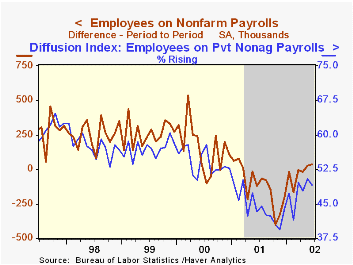 Global| Jul 05 2002
Global| Jul 05 2002June Payrolls Weak, Jobless Rate Up
by:Tom Moeller
|in:Economy in Brief
Summary
Payrolls rose somewhat less than expected last month and the modest May gain was revised down. The modest rise in June payrolls was accompanied by a sharp 364,000 drop (-0.7% y/y) in household employment which pushed the unemployment [...]

Payrolls rose somewhat less than expected last month and the modest May gain was revised down.
The modest rise in June payrolls was accompanied by a sharp 364,000 drop (-0.7% y/y) in household employment which pushed the unemployment rate up as expected. The labor force fell 293,000 (0.7% y/y).
Amongst industries, factory sector jobs fell and are down 11.3% from the peak in early 1998. Construction jobs rose in June but are down 1.2% so far this year. Jobs in service producing industries ticked up and the year-to-date gain is a meager 0.2%.
The one-month diffusion index for nonfarm payrolls fell to 49.1, up versus the November low of 39.3. The level still suggests little or no employment growth near term.
The index of aggregate hours worked (employment times hours worked) rose in June but was up just slightly in 2Q versus the 1Q average.
Average hourly earnings rose slightly more than expected following a downwardly revised May gain.
The employment figures for nonfarm payrolls are based on reports provided to the US Labor Department by businesses, while the figures from which the unemployment rate is derived are based on a survey of US households.
| Employment | June | May | Y/Y | 2001 | 2000 | 1999 |
|---|---|---|---|---|---|---|
| Payroll Employment | 36,000 | 24,000 | -1.0% | 0.2% | 2.2% | 2.4% |
| Manufacturing | -23,000 | -27,000 | -5.6% | -4.2% | -0.4% | -1.3% |
| Average Weekly Hours | 34.3 | 34.2 | 34.2 | 34.2 | 34.4 | 34.5 |
| Average Hourly Earnings | 0.4% | 0.1% | 3.3% | 4.1% | 3.9% | 3.6% |
| Unemployment Rate | 5.9% | 5.8% | 4.6% | 4.8% | 4.0% | 4.2% |
Tom Moeller
AuthorMore in Author Profile »Prior to joining Haver Analytics in 2000, Mr. Moeller worked as the Economist at Chancellor Capital Management from 1985 to 1999. There, he developed comprehensive economic forecasts and interpreted economic data for equity and fixed income portfolio managers. Also at Chancellor, Mr. Moeller worked as an equity analyst and was responsible for researching and rating companies in the economically sensitive automobile and housing industries for investment in Chancellor’s equity portfolio. Prior to joining Chancellor, Mr. Moeller was an Economist at Citibank from 1979 to 1984. He also analyzed pricing behavior in the metals industry for the Council on Wage and Price Stability in Washington, D.C. In 1999, Mr. Moeller received the award for most accurate forecast from the Forecasters' Club of New York. From 1990 to 1992 he was President of the New York Association for Business Economists. Mr. Moeller earned an M.B.A. in Finance from Fordham University, where he graduated in 1987. He holds a Bachelor of Arts in Economics from George Washington University.
More Economy in Brief
 Global| Feb 05 2026
Global| Feb 05 2026Charts of the Week: Balanced Policy, Resilient Data and AI Narratives
by:Andrew Cates






